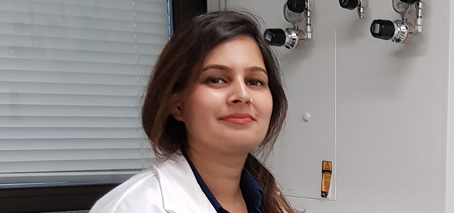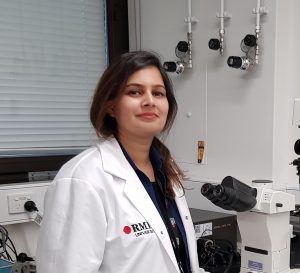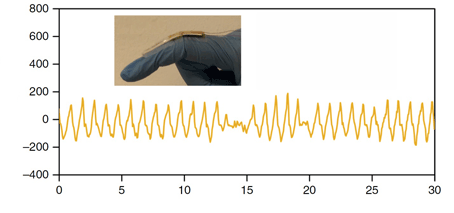Currently applying materials skills learned at FLEET/RMIT to improve solar technologies, at CSIRO
Greetings from CSIRO!
I was a PhD student at FLEET / RMIT from 2017 to 2020, working on the development of piezoelectric and sensing applications of atomically thin materials.
“The thing I enjoyed most about FLEET, other than the technical aspects of my work, was the sense of community, support for the members as well as the ample opportunities provided to gain exposure to various experiences, information and skill-up experiences.”
Currently, I am 3 years into my CERC Postdoctoral Fellowship in the Solar Technologies group, Energy at CSIRO.
My postdoc work has made use of a lot of the skills I developed at FLEET, such as material synthesis, characterisation and testing, but being applied to different technologies such as solar cells.
I am developing barrier materials for electronic devices with the aim to improve their lifetimes. The global market for consumer electronics was estimated to be worth US$1.10 trillion in 2021 and is estimated to grow to about US$1.70 trillion by 2028 at a compound annual growth rate (CAGR) of 7.6% in this period. If we look more specifically at the renewable solar energy space, the solar encapsulation market was valued at US$2.6 billion in 2020 and is projected to reach $6.1 billion by 2030.
Current solar technology market trends show a gap for high barrier materials exist as new upcoming technologies are more sensitive to water ingress based on the structures and materials being used in comparison to previous, conventional silicon-based technologies. To advance these technologies toward widespread commercialisation, a need exists for improved barrier materials.
Science is a team sport
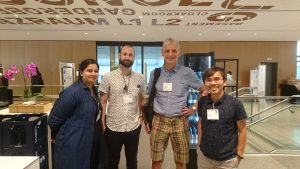
Hareem with the FLEET crew at the Nobel laureate meeting in Lindau, Germany 2019, Reeves (UQ) and Eli Estrecho (ANU) with Wolfgang Ketterle (Nobel Prize in Physics 2001, Bose-Einstein condensates)
I think another important skill learnt during my time at FLEET which is proving very useful is the ability to network…
We cannot have expertise on all the aspects of the work we do and collaboration is key to achieving quality results with inputs from various experts of their fields.
However this is often not as simple as asking someone for help or information. A strategic management of giving credit as well as management/driving of the whole endeavour is vital to ensure it happens smoothly.
Exploring all the options in Job-hunting
At the end of my PhD I explored a fair few options before deciding on taking up this fellowship. And again here I credit FLEET for the help and guidance provided at this time. I was introduced to a number of contacts who I was able to interview and gain some insight into what the roles I was looking at involved.
I considered roles with IP Australia or as a patent attorney, Science Policy and Defence as well as numerous R&D opportunities in industry.
The one thing I learnt from my job-hunting process was firstly not to underestimate your value and the value of your skills. There are many, many opportunities out there for research-trained people and the skillsets we earn during the process and we should not limit ourselves to just the ‘familiar’ environments because we are comfortable in them. Exploring other options, if you can, is always a great way to find new ways to apply your skills as well as understand what you enjoy.
I think FLEET was fundamental in bringing this perspective to me as well because we were exposed to speakers from all of these various backgrounds as well as being given opportunities to attend events like Science Meets Parliament.
How I got into science
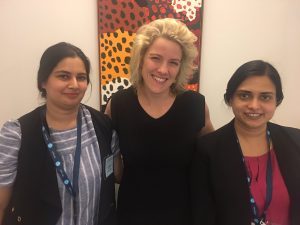
Hareem and Semonti Bhattacharyya (Monash) with Victorian MP Clare O’Neil: Science Meets Parliament 2019
I got into Science because I enjoyed it so much as a school subject from an early age. I was lucky in that, having attended an all-girls school, I was oblivious to the school of thought that girls weren’t good at Science – because quite a number of us were, and we actually didn’t bother with a comparison at all.
My Science teachers were all female and you can imagine the major shock I had when entering University and experienced the dismally small percentage of females in the Engineering cohort let alone in the Electronics engineering stream specifically. Luckily, that did not shake my confidence at all and in fact, the supportive environment was very confidence-building and I graduated as a competent and confident skilled engineer.
My father’s support also had a substantial role in my inclination to Science and Engineering and my decision to study Electronics engineering was a huge source of pride and accomplishment for him as well.
In my A-levels I studied Maths, Chemistry, Biology and Physics. The common combination was Maths and Chem with Bio or Physics, depending on if you went through the Medicine or Engineering route, but I opted to keep both options.
Managing the work-life balance
My personal take on mental health and work life balance is that no two days are the same and you have to actively work to maintain both.
So there will be days when you need to work a little more, and some periods where family needs you more, and the overall average running balance is more important.
Pertaining to mental health, we spend substantial amounts of our day where we work and so when we select a role we should put equal importance on the team dynamics and culture of the place you will be working at. When they interview you, they also consider if you would fit with them, so why do we not do that? You can have the best job but in the wrong team culture it can become unbearable and similarly having a great team culture (like my current one at CSIRO) can really boost you to do exceptional things and work is just enjoyable.
A very positive memory of my lockdown time was getting a writing grant from FLEET to help me at the tail end of my PhD. I was off the end of my maternity leave, home-schooling and taking care of a baby and this grant helped to get the assistance to spend the time on writing my thesis and the pending manuscripts – so thanks once again to FLEET!
Doing what you love, and grabbing opportunities
In summary, words of advice for incoming students, school leavers and people possibly moving between roles: take the time to know what you enjoy, and take up as many opportunities as you can with the mindset that it is an experience and that you will always learn something from it – and at the very least you will learn more about yourself.
This will help you know your value and your skills which you can apply to the best place.
Also in furthering your career it’s very important to have honed your ‘soft’ skills – that is usually a gamechanger when trying to apply for the role you want, and these are skills that very few people usually have, or have worked on.
Hareem Khan
CERC Postdoctoral Fellow | CSIRO
email me at Hareem.Khan@csiro.au / connect on Linkedin

